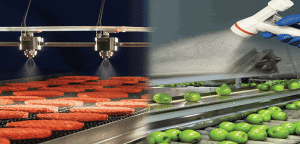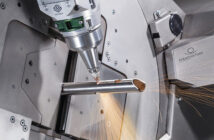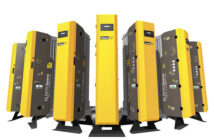
One of the most critical aspects of a food processing plant is the food safety practices that have been put in place.
One of the most critical aspects of a food processing plant is the food safety practices that have been put in place. Ensuring you are using the appropriate spray technology products and systems will assist you in achieving the highest level of food safety possible in your plant.
Spraying Systems NZ Ltd endeavours to help customers using the knowledge and expertise it has gathered over the past 79 years, providing spray solutions to the food processing industry. The company has a range of specialised automated systems and spray products designed to suit a wide variety of food safety and hygiene applications.
Many of its spray systems use Precision Spray Control (PSC) to ensure uniform coating of a product or surface. PSC works by turning electrically-actuated spray nozzles on and off very quickly to control the flow rate. The cycling is so fast that the flow often appears to be constant. Pressure of the spray nozzles remains unaltered, which means the spray angle, coverage and drop size do not change. Due to the consistent pressure level, misting and overspray are reduced, if not eliminated completely. Not only does this decrease the amount of time spent cleaning the floors and surrounding equipment, but it also leads to improved worker safety.
PulsaJet spray nozzles are the typical choice for PSC systems. The food-grade spray nozzles are constructed from materials approved for food processing applications, and can spray even the most difficult of coatings. Some of the coatings that can be sprayed successfully include butter, caramel, egg wash, peanut butter, glaze and wax, to name a few.
The AutoJet Food Safety Spray Systems utilise both PSC and PulsaJet spray nozzles fitted with UniJet spray tips to ensure safer food production while lowering operating costs. The systems are ideal for spraying antimicrobial agents on bagged whole muscle products, formed products, fresh meats, packaged poultry and sliced meat products, and can be used for effective and repeatable sanitising of conveyors and surrounding equipment.
The AutoJet Food Safety Systems ensure exact application and uniform coverage of antimicrobials and sanitisers to enhance product safety with minimal waste. The systems have been proven to effectively control the prevalence of pathogens, and can easily be incorporated into existing HACCP plans. A meat processing company assisted by Spraying Systems has been able to extend the shelf-life of its meat products by 40% since the implementation of an AutoJet Food Safety System.
An option that can be used for sanitising an entire room is through the use of the MiniFogger III, which is a compact and lightweight fogging unit that is suitable for installation on walls, ceilings and in corners. The energy efficient unit emits a fine mist, with drops in the 7-12 micron range. Added benefits of using the MiniFogger III include consistent misting and automatic spray alignment of the spray nozzles.
In addition to the food safety systems for meat and poultry processing plants, the company also has systems developed for the intermittent spraying of mould inhibitors onto baked goods and cheese. The process of coating these products with mould inhibitors and preservatives is undertaken to extend the shelf life of the products. Just as important as the agents themselves, is the amount of agent sprayed. Shelf life will suffer if too little of the agent is applied, and when an excess amount is applied, the taste of the product can be negatively affected which may lead to customer complaints. The AutoJet Mould Inhibitor Spray System uses PSC to ensure that the exact dose of mould inhibiting and preservative agent is used to ensure the product is evenly coated without affecting the appearance or taste. A commercial bakery reported an increased shelf life to an average of seven days after the installation of the AutoJet Mould Inhibitor Spray System. A cheese processor was also able to increase the shelf life of its shredded cheese, as well as enhance the overall quality through the use of the system.
Furthermore, ensuring the level of safety and to prevent potential recalls of food products, operators need to safeguard the way processing equipment – such as conveyors, tanks and slicers – are cleaned. For cleaning and rinsing applications, Spraying Systems has a wide range of tank cleaning products and handheld spray guns designed for a thorough and effective clean to avoid risking contamination of food products.
The TankJet tank cleaning products are designed to clean tanks, barrels, totes, vats and vessels (as small as 1m and as large as 30m in diameter) while reducing water and chemical use. From gentle rinsing to high-impact cleaning, the tank cleaning products offer automated solutions to ensure the highest quality clean possible, offering both portable and cleaning-in-place (CIP) tank cleaning options.
GunJet spray guns are ideal for general plant and equipment clean-up applications and are available in high, medium and low pressure options. The smooth-pull triggers allow for accurate and consistent flow, while the ergonomic handles aid in the comfort of the operator as they are specially designed to improve control and reduce operator fatigue. Spraying Systems spray guns are able to optimise overall cleaning operations while decreasing cleaning time. Using a manual spray gun allows you to sanitise hard-to-reach areas such as corners and undersides of equipment. Another benefit of using a handheld spray gun is the ability to clean and sanitise without spreading contaminants to surrounding equipment.




























































































